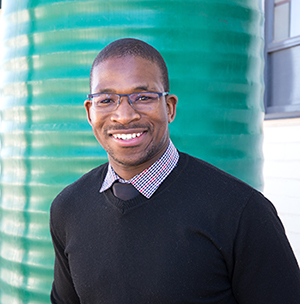Latest News Archive
Please select Category, Year, and then Month to display items
17 June 2020
|
Story Dr WP Wahl

The Division of Student Affairs (DSA) prioritises innovation to meet the challenges of food insecurity and malnutrition among students. To this end, several student volunteers and student governance structures are collaborating with the DSA on various initiatives.
During 2019, various conversations were held about the possibility of creating a health-promoting food environment at the UFS where students and staff are well informed and empowered to take appropriate action regarding their food and nutritional needs. These conversations resulted in an institutional strategy to address the food environment at the UFS. Student representatives serve on a technical committee that directs the implementation of this strategy. In this regard, several initiatives have already been launched.
Students from residences and other student communities have planted vegetable gardens on the Bloemfontein Campus with the assistance of KovsieACT and the Faculty of Natural and Agricultural Sciences. Students and staff are already harvesting and distributing vegetables to needy students every week. Measurements were put in place to continue this during the COVID-19 period. The following vegetables were planted: spinach, cabbage, beetroot, broccoli, cauliflower, and carrots.
Food parcels, donated by Tiger Brands and Gift of the Givers, are continuously handed out by DSA staff and student volunteers. In this regard, 540 food parcels have already been handed out on the Bloemfontein Campus during the COVID-19 period alone. During the same time, 117 students received food parcels on the Qwaqwa Campus. The innovation of this food parcel project rests on the fact that business, NPOs, UFS students, and DSA staff are collaborating to address food insecurity and malnutrition.
More collaborative initiatives will be implemented over the next 12 months. The DSA staff and students are already working with the Department of Dietetics and Consumer Sciences to create information packages about the preparation of low-budget nutritious meals.
Related article:
Vegetable tunnels established to continue the fight against food insecurity
University of the Free State strives towards going ‘green’
2017-08-07

Benedict Mochesela from University Estates on the
UFS Bloemfontein Campus. A total of thirty brand-new
water storage tanks, between 5 000 and 20 000 litres,
were installed.
Photo: Anja Aucamp
Eight provinces, including the Free State, were declared disaster areas last year due to the ongoing drought. This had a devastating effect on the agricultural sector, leaving many communities dry.
University Estates at the University of the Free State found an ideal project to make university buildings greener. A total of thirty water storage tanks, varying in size from 5 000 to 20 000 litres, were installed at various buildings on the Bloemfontein Campus. As a pilot phase, these tanks were specifically installed at residences and buildings with high traffic volumes.
Importance of water tanks at the UFS
According to Benedict Mochesela, Project Manager of this initiative, the purpose of the project is to harvest rainwater, which will be used during emergencies when the campus does not have water and the emergency water storage facility is depleted. “This water is not intended for drinking, but for the flushing of toilets,” says Mochesela.
He mentioned that the water will also be used for watering flowerbeds and gardens when the water has been standing for a long time without being used.
Recycling water: An initiative to protect the environment
A number of water storage tanks are already in place at the Qwaqwa Campus and a preliminary phase of using grey water from residences is currently ongoing at the South Campus. Grey water is made up of bath, shower, and bathroom sink water. The water is reused for toilet flushing as well as for irrigation purposes.
“Recycling of water is one of a number of initiatives the university intends to undertake to ensure and show the community that this institution remains conscious of the environment and to changes which we continuously need to adapt to.”